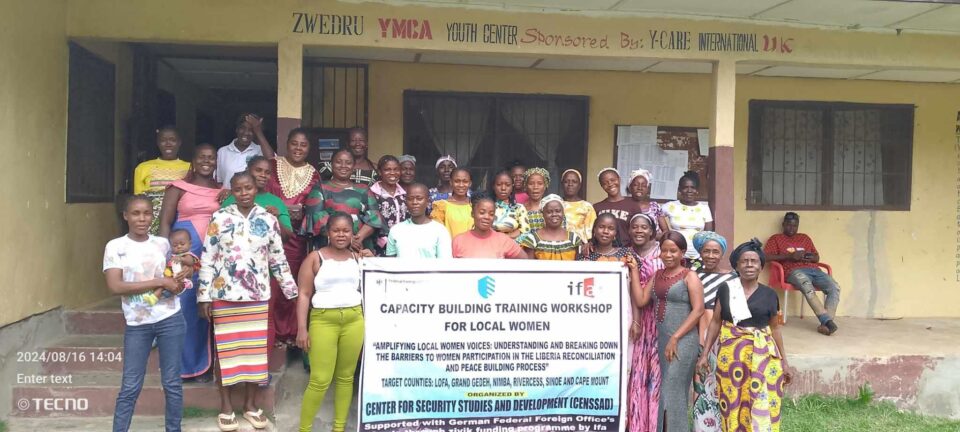And To Strengthen Their Participation In Peacebuilding and Reconciliation Processes
Monrovia–The Center for Security Studies and Development (CENSSAD) recently continued its landmark series of training workshops targeting local women with the aim of empowering them to serve as champions of women rights advocacy and to strengthen their participation in peace building and reconciliation processes.
The latest capacity building training workshop was held in Zwedru City, Grand Gedeh County and brought together forty-five (45) local women. The Activity is part of a nine-month project, being implemented by CENSSAD under the theme, “Amplifying Local Women Voices: Understanding and Breaking Down the Barriers to Women Participation in Liberia Reconciliation and Peace Building Processes”
The workshop was facilitated by a team of experienced facilitators and covers topics relating to consensus-building, conflict resolution, gender, leadership, human rights, citizens’ participation, peace building, inclusive governance and non-adversarial advocacy. It sought to further build the capacities of participants to serve as catalysts for peace building, security, women rights and reconciliation in the communities and provided them with the tools necessary to engender peace, security and reconciliation at both local and national levels.
The workshop in Zwedru was the last part of capacity building workshops, following the first phase which took place in Lofa, Rivercess, Sinoe, Grand Cape Mount and Nimba counties. At the end of the training, participants established a Local Women Peace and Security Network to serve as a permanent mechanism to report on and address barriers to women’s participation in the reconciliation process.
As part of the project, CENSSAD has already completed a survey which was intended to acquire systematic, in-depth knowledge about the drivers of Liberian women’s systematic exclusion from the reconciliation process. More specifically, CENSSAD conducted 1200 one-on-one semi-structured interviews with women residing in the six counties in order to examine the barriers that underline their neglect in the reconciliation process. The survey is expected to be formally launched in Sanniquelle, Nimba County on 26 September 2024. The Launch Ceremony will be followed by a number of women-led Peace and Reconciliation Dialogues for women and local stakeholders. These dialogues will be organized to foster intra-community dialogue among the female population and local stakeholders to develop strategies and formulate recommendations about how to address the barriers identified during the interviews. During these meetings, women will be given the opportunity to openly discuss what they themselves could do within their communities to make a larger contribution to the reconciliation process and what kind of external support they would need to overcome the barriers that have prevented them from doing so in the past. At the same time, participating women will have the chance to express their opinion about what the government should do to address women’s marginalization in reconciliation.
This project contributes to the establishment of an inclusive reconciliation process that aligns with both the 2003 Comprehensive Peace Agreement (CPA) and the 2017 Liberia Peacebuilding Plan (LPP).
The project is supported by the German Federal Office’s Funds through the Zivik Funding Programme by ifa (Institut für Auslandsbeziehungen). The Zivik Funding Programme supports civil society actors worldwide in preventing crises, transforming conflicts, and creating as well as stabilizing peaceful social and political systems.

